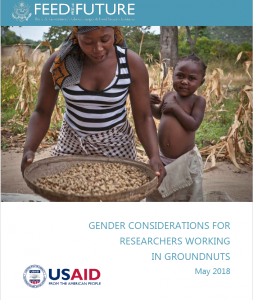USAID’s Bureau for Food Security has published a paper detailing what we’ve learned about gender roles in peanut production and processing over the past several years, as well as what areas researchers need to consider as they work with peanuts.
“Gender Considerations for Researchers Working in Groundnuts,” prepared by Carol Tyroler, summarizes many of the lessons learned about gender from previous projects in the Peanut & Mycotoxin Innovation Lab, while explaining how attention to gender differences can make research findings more applicable in the real world.
Groundnuts are often referred to as a woman’s crop because of the roles females play in production and processing across many developing countries. Men also produce groundnuts, but gender roles and responsibilities vary according to the region and culture of the place.
In the countries considered in the analysis – Ghana, Zambia, Malawi, Mozambique, Uganda, and Haiti – groundnuts are a subsistence, rain-fed crop, predominantly grown, managed and processed by women on small household plots ranging from 0.2 to 2 hectares.
The majority of groundnuts women produce (more than 80 percent in some places) goes towards household consumption; surplus is sold to local traders or in local markets to generate income.
Those simple facts create interesting considerations for researchers, the paper points out. For example, when men consider different plant varieties, yield is often their most important priority. Since women may bear the burden of processing and cooking the crop, ease of shelling and flavor or oil content may be more important to them. Understanding men’s and women’s different priorities can help breeders develop varieties that farmers want.
Gender is a specific area of interest in the current Feed the Future Innovation Lab for Peanut. While youth and gender are specific areas of inquiry for project proposals, considerations related to those groups also are cross-cutting and should be addressed in every project, according to the lab’s agreement with USAID.
